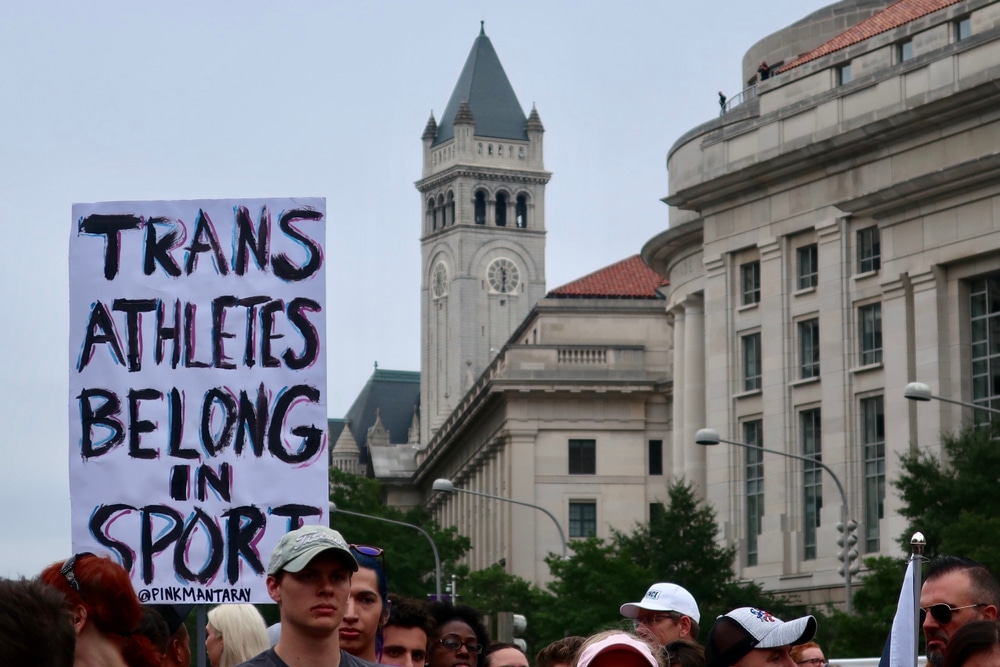The Central Bucks School Board is moving to retire the controversial policy adopted by the previous board on Sex-Based Distinctions in Athletics [Policy 123.3]. Some readers might remember that this policy was one in a series of policies influenced by organizations like the Family Research Council (via their legal arm the Independence Law Center), whose website explicitly states, “We’re working together to make sure that decisions being made in America are based on biblical values.”
I am not a biblical scholar, but two points jump out at me right away. First, public school policy should not be written based on biblical values. Public schools welcome students from many faith traditions and promoting one religious stance over another would be discriminatory. And secondly, isn’t a core belief of Christianity that God loves everyone, unconditionally? It seems counterintuitive to work to exclude and hurt children based on who they are.
During my time on the school board, we had clergy come to speak at public comment on more than one occasion. Most often, these were calls to embrace and include students and community members – even celebrate their diverse identities. To be sure, many faiths welcome the LGBTQ+ community and that it is the “church’s responsibility to simply honor that reality and rejoice (Luke 15)”. The call to exclude certain children from sports seems decidedly anti-Christian.
So, what’s all the hubbub?
In this piece I will break down some of the arguments for and against sex based distinctions in athletics. Notably, I am not going to write about the law. But, there is a lot to say about that as well. If you are interested, the Education Law Center offers this brief analysis.
One of the arguments against allowing trans students to participate in athletics is the idea that it is not fair or safe. In fact, Policy 123.3 states its purpose as, “Separate athletic teams on the basis of sex preserve fairness, provide increased opportunities for girls, and are safer.” Critics of including trans students argue that trans girls may have physical advantages over cisgender girls, skewing competition results. There is no doubt that [in general] biological males have a physiological advantage over biological females. However, development is variable and it is not uncommon for school aged girls to be faster, stronger, and more flexible than some boys. Additionally, there is something called “experience dependent development”. Experience dependent development means that the more experience you have with something the better you will be at it. For instance, a girl who plays soccer for years will likely be better than a boy who has never played. Finally, there are physical variations among groups. Not all boys have the same athletic ability, physical stature, or strength. If we are worried about safety, should we exclude any child who is shorter, slower, or hasn’t yet gained muscular strength?
Also, note that the policy states, “opportunities for girls”. Implicit in all of these policies is a curious exclusion of trans boys. Again, if we were worried about safety, why is there so little attention on trans boys? Ostensibly, these far right Christian groups are mostly worried about the possibility of trans girls skewing competition than any real safety concerns. Otherwise, we might worry about the one trans boy on the football team rather than the one trans girl on the swim team – right?
Another real problem with Policy 123.3 is this line – “If the Superintendent or Athletic Director has a reasonable basis to believe that the student’s sex is other than designated…”
READ: Today, Tomorrow, and Yesterday as a Transgender Youth – in Bucks County and Across the Country
That’s super dangerous.
I wonder what constitutes a “reasonable basis”. I was a pretty tough kid. I was always an athlete and liked to play rough. I was the field hockey goalie and the softball catcher. If I was running to home plate, I would unapologetically run the opposing catcher down. I once had a crush on a boy and was told by a mutual friend that the person didn’t like me because I was “too sweaty”. On the continuum of stereotypical masculine to feminine behavior, I was definitely more masculine. Would those data points constitute a “reasonable basis” to question my sex? On the flip side, there are trans kids who would never be outed based on their appearance or comportment. Why is it so hard to just accept others in the way they ask us to?
One of my former fellow board members, Mariam Mahmud, consistently reminded us of the benefits to socialization and mental and physical health that participation in school sports offers. At one particular meeting I pointed out that the CBSD Athletics Handbook notes “students first, athletes second” and suggested that we discuss the purpose of school sports. That suggestion prompted quite a few personal attacks on me – via email, on social media, and in subsequent public meetings. But, the truth is that although some of our student athletes will go on to collegiate and maybe even professional sports, the vast majority of them are benefitting in a more holistic way. And, the role of public schools isn’t to prepare students for elite athletics but rather provide access to the many benefits of participation. There are myriad purposes of school sports that include physical fitness, improving social skills, enhancing mental health, time management, leadership skills, and more. Moreover, we know that participation in school sports has a positive impact on academic outcomes.
And, by the way, although the anti-trans movement likes to hold up the same four trans athletes over and over to make their argument, according to the NCAA, there are almost 500,000 athletes competing in collegiate sports. Trans athletes don’t even move the needle. But, using this kind of logical fallacy is a common manipulative move to try to sway opinion. While individual cases do exist, the narrative that trans athletes are consistently taking spots/scholarships away from non-trans athletes is largely anecdotal – and also not relevant to K-12 public schooling.
Unfortunately, research shows that transgender youth suffer from depression at more than twice the rate of their non-transgender peers. Making sure that vulnerable students have access to as many positive school based opportunities as possible seems like an obvious “yes” to me. Now, one of my former Board colleagues would respond that these students do have access to sports, they just need to play on the “right team”. In fact, the policy states that it should not be “construed” as “[restricting] the eligibility of any student to participate in any athletic teams or sports of their sex..”. But, let’s be honest. If a trans girl who moves through the world as a girl and is accepted in every space as a girl, all of a sudden shows up on a boys’ team, how is that going to go? Or, a trans boy who everyone knows as a boy suddenly shows up on the girls’ soccer team. The suggestion is absurd and just grounded in a bigoted view of trans people.
The bottom line is that inclusion, access, and belonging are important to the development of our children. Public schools welcome children from all backgrounds, religious traditions, and beliefs. Excluding a child based on any aspect of their identity is inhumane. I realize that there are those who will see this as another reason to argue for dismantling public schools. What a shame. America is a uniquely special place that offers access to education to everyone because we know it prepares students for success, reduces inequality, promotes civic engagement, and ultimately makes our democracy stronger. If you feel strongly about this issue, I encourage you to make your voice heard at the next school board meeting or by writing to your local school director.







